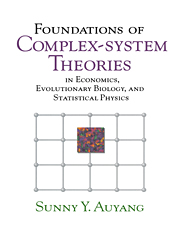Book contents
- Frontmatter
- Contents
- Preface
- 1 Introduction
- PART I EQUILIBRIUM
- 2 Theories of Composite Systems
- 3 Individuals: Constituents and Systems
- 4 Situated Individuals and the Situation
- 5 Interacting Individuals and Collective Phenomena
- 6 Composite Individuals and Emergent Characters
- PART II DYNAMICS
- Notes
- Bibliography
- Name Index
- Subject Index
3 - Individuals: Constituents and Systems
Published online by Cambridge University Press: 11 May 2010
- Frontmatter
- Contents
- Preface
- 1 Introduction
- PART I EQUILIBRIUM
- 2 Theories of Composite Systems
- 3 Individuals: Constituents and Systems
- 4 Situated Individuals and the Situation
- 5 Interacting Individuals and Collective Phenomena
- 6 Composite Individuals and Emergent Characters
- PART II DYNAMICS
- Notes
- Bibliography
- Name Index
- Subject Index
Summary
An Individual and Its Possibilities: The State Space
The first question in any scientific research is its subject matter: What are we studying? The most general answer is a certain kind of system. A system, no matter how complex, is an individual, which is logically a particular, a unit with characters describable in general terms and a unique identity that enables us to single it out and refer to it unambiguously without invoking its characters. We must delineate the system before we delve into its properties. Thus the first general concept in the formulation of a theory is that of an individual. Individuals are represented in scientific theories by the state spaces, which form the keystone of the theories by defining their topics. The notion of a composite system as an integral individual with its own state space is the synthetic conceptual framework of many-body theories.
The general concept of a concrete individual in the real world is much more complicated than that of an abstract individual, which may be merely an unanalyzable x over which predicate variables range. The complication is most apparent in many-body theories, where both the composite system and its constituents are explicitly treated as individuals. An individual is isolated if it is not encumbered by any relation and not guaranteed to be relatable; situated, if it is an interactive part of a system; composite, if analyzable into parts; simple, if not.
- Type
- Chapter
- Information
- Foundations of Complex-system TheoriesIn Economics, Evolutionary Biology, and Statistical Physics, pp. 84 - 114Publisher: Cambridge University PressPrint publication year: 1998



